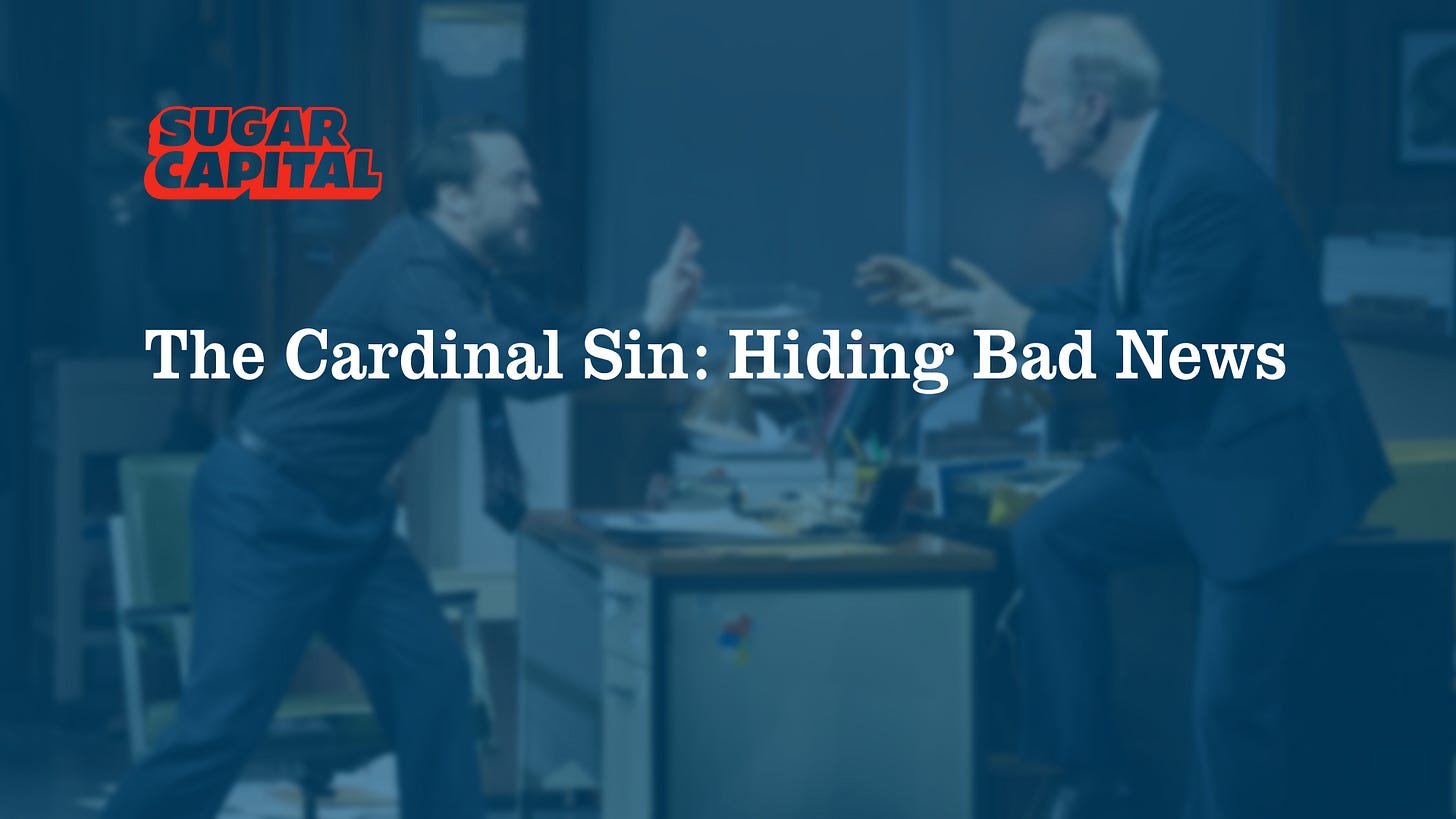The Cardinal Sin: Hiding Bad News
Why Biden's Cancer Diagnosis Offers a Lethal Lesson for Founders
“A man's his word and his word is his bond.” - Shelley “The Machine” Levene, Glengarry Glen Ross (2025, Broadway)
Last Saturday, as Lisa and I watched the Glengarry Glen Ross matinee on Broadway, I was struck by how Mamet's desperate salesmen build fictions to survive—lies that inevitably collapse. The parallels to founders who hide uncomfortable truths were impossible to miss. Less than 24 hours later, life imitated theater.
Last Sunday, as most Americans were finishing brunch or starting yard work, a bombshell dropped from a former president's office: Biden has Stage 4 prostate cancer. Not just cancer. Advanced. Metastasized. Silently spreading through his bones. The news hit with devastating precision, but what followed wasn't just sympathy. It was suspicion.
How did the most monitored man in America—with a battalion of physicians at his disposal and the world's finest healthcare—miss detecting one of medicine's most common and screenable cancers until it was ravaging his skeleton?
The answer nobody wants to say out loud: someone chose concealment over candor.
In that instant, the Biden saga transformed from a personal health tragedy into a perfect parable for founders who think they can hide uncomfortable truths from their investors. I've witnessed this exact pattern dozens of times, and the ending is always the same—catastrophic.
The political fallout has been swift and merciless. A White House already under fire for "methodical deception" about Biden's declining condition is being accused of a full-blown cover-up. The administration's protestations of innocence ring hollow against a backdrop of late disclosures and information gaps that have left the public feeling, in CNN's Jake Tapper's blunt assessment, "lied to over and over again."
For startup founders, the lesson couldn't be clearer or more urgent. The path from wunderkind to pariah is short and slippery when paved with half-truths.
I've seen it countless times from my position at Sugar Capital. A promising company begins to falter. Key metrics slide. Customer acquisition costs creep upward. Retention numbers soften. And the founder, desperate to maintain the illusion of inevitable success, begins the dangerous game of information management. The bad news is softened, spun, or buried in footnotes.
By the time the full picture emerges—often through the cold, hard reality of numbers that can no longer be massaged—the damage is done. It's not just the specific problem that investors now distrust, but the founder's judgment and integrity.
This pattern of withholding is often rationalized as protection—of the company's reputation, employee morale, or founder autonomy. But just as Biden's team may have believed they were shielding him (or the nation) by potentially downplaying health concerns, such thinking is dangerously misguided.
Last Saturday, as Lisa and I watched the Glengarry Glen Ross matinee on Broadway, I was struck by how Mamet's salesmen create elaborate fictions to survive—lies that inevitably collapse. The parallels to founders who hide uncomfortable truths are impossible to miss. In both worlds, information in the digital age doesn't remain buried; it festers, then detonates with tenfold impact. The initial problem, whether a cancer diagnosis or a missed sales quarter, is inevitably compounded by the secondary crisis of credibility.
The Democrats now find themselves grappling with this exact compounding effect. Having already weathered a presidential debate performance that raised serious questions about Biden's fitness, followed by his late withdrawal from the race that left the party scrambling, they now face a public wondering what else might have been concealed. The currency of trust, once squandered, is exceedingly difficult to reclaim.
For founders, the parallel is unmistakable. The board member who discovers a material issue that should have been disclosed weeks earlier doesn't just question that specific decision—they begin to review every past interaction through the lens of newfound skepticism.
The antidote is disarmingly straightforward: embrace the discipline of radical transparency. Bad news should travel faster than good. Problems should be shared when they're molehills, not mountains. Potential risks should be disclosed before they materialize.
This doesn't mean subjecting your board to every fleeting concern or operational hiccup. It means developing the judgment to distinguish between normal business fluctuations and meaningful developments that could affect the company's trajectory or valuation.
The psychological barrier to this approach is obvious. No one enjoys delivering disappointing news. Founders, by nature optimistic and solution-oriented, particularly chafe at admitting setbacks. But the alternative—the Biden scenario of eventual discovery followed by reputation collapse—is far worse.
Moreover, transparency creates opportunities for collaborative problem-solving. I've seen countless situations where early disclosure of a problem led to introductions, strategic shifts, or resource allocations that transformed potential disasters into manageable challenges.
In the unsparing arithmetic of reputation, trust is built in drops and lost in buckets. Every instance of transparency—even when painful—adds to the reservoir of credibility that may someday be needed. Every concealment, no matter how seemingly justified, drains that same reservoir.
The Democratic party now bears the weight of that reservoir being nearly depleted. Those who defended the president's capacity are left answering to an electorate wondering what else they might have missed, or chosen to ignore.
Founders would do well to internalize this cautionary tale. In the pressure cooker of venture-backed companies, where futures hinge on faith as much as financials, there is no asset more valuable than trust and no principle more essential than "no surprises."
Trust isn't a renewable resource. Once it's gone, so is your leverage.
As Shelly Levene declares in Mamet's Glengarry Glen Ross, "A man's his word and his word is his bond." The tragic irony of the play—and of too many founder journeys—is watching this principle collapse under pressure. When Levene can't close deals, he resorts to breaking in and stealing leads. When founders face missed targets, many instinctively hide problems rather than address them openly. Both paths lead to the same destination: ruin.
Hide nothing. Say it early. Say it straight. No surprises.


